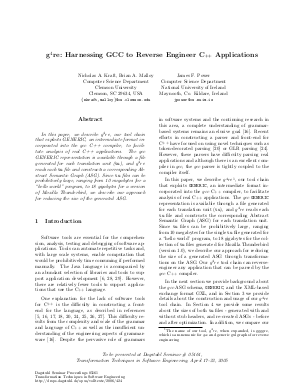g4re: Harnessing GCC to Reverse Engineer C++ Applications
Authors Nicholas A. Kraft, Brian A. Malloy, James F. Power
-
Part of:
Volume:
Dagstuhl Seminar Proceedings, Volume 5161
Part of: Series: Dagstuhl Seminar Proceedings (DagSemProc) - License:
 Creative Commons Attribution 4.0 International license
Creative Commons Attribution 4.0 International license
- Publication Date: 2006-03-07
File

PDF
DagSemProc.05161.4.pdf
- Filesize: 296 kB
- 11 pages
Document Identifiers
Subject Classification
Keywords
- Reverse engineering
- schema
- GXL
Metrics
- Access Statistics
-
Total Accesses (updated on a weekly basis)
0Document
0Metadata
Abstract
In this paper, we describe g4re, our tool chain that exploits GENERIC, an intermediate format incorporated into the gcc C++ compiler, to facilitate analysis of real C++ applications. The gcc GENERIC representation is available through a file generated for each translation unit (TU), and g4re reads each TU file and constructs a corresponding Abstract Semantic Graph (ASG). Since TU files can be prohibitively large, ranging from 11 megabytes for a "hello world" program, to 18 gigabytes for a version of Mozilla Thunderbird, we describe our approach for reducing the size of the generated ASG.
Cite As Get BibTex
Nicholas A. Kraft, Brian A. Malloy, and James F. Power. g4re: Harnessing GCC to Reverse Engineer C++ Applications. In Transformation Techniques in Software Engineering. Dagstuhl Seminar Proceedings, Volume 5161, pp. 1-11, Schloss Dagstuhl – Leibniz-Zentrum für Informatik (2006)
https://doi.org/10.4230/DagSemProc.05161.4
BibTex
@InProceedings{kraft_et_al:DagSemProc.05161.4,
author = {Kraft, Nicholas A. and Malloy, Brian A. and Power, James F.},
title = {{g4re: Harnessing GCC to Reverse Engineer C++ Applications}},
booktitle = {Transformation Techniques in Software Engineering},
pages = {1--11},
series = {Dagstuhl Seminar Proceedings (DagSemProc)},
ISSN = {1862-4405},
year = {2006},
volume = {5161},
editor = {James R. Cordy and Ralf L\"{a}mmel and Andreas Winter},
publisher = {Schloss Dagstuhl -- Leibniz-Zentrum f{\"u}r Informatik},
address = {Dagstuhl, Germany},
URL = {https://drops.dagstuhl.de/entities/document/10.4230/DagSemProc.05161.4},
URN = {urn:nbn:de:0030-drops-4244},
doi = {10.4230/DagSemProc.05161.4},
annote = {Keywords: Reverse engineering, schema, GXL}
}
